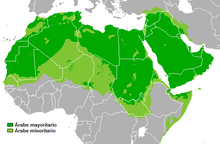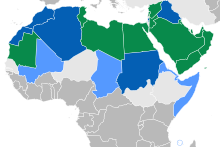Arabic language
Arabic (Arabic: العَرَبِيَّة, Al-ʻarabiyyah [ʔalʕaraˈbijːah] or Arabic: عَرَبِيّ ʻarabiyy [ʕaraˈbijː]) is a Central Semitic language that was first spoken in Iron Age northwestern Arabia and is now the lingua franca of the Arab world. It is named after the Arabs, a term initially used to describe peoples living from Mesopotamia in the east to the Anti-Lebanon mountains in the west, and from northwestern Arabia to the Sinai in the south.
Some of the spoken varieties are mutually unintelligible, both written and orally, and the varieties as a whole constitute a sociolinguistic language. This means that on purely linguistic grounds they would likely be considered to constitute more than one language, but are commonly grouped together as a single language for political or religious reasons (see below). If Arabic is considered a single language, it is perhaps spoken by as many as 422 million speakers (native and non-native) in the Arab world, making it one of the six most-spoken languages in the world. If considered separate languages, the most-spoken variety would most likely be Egyptian Arabic with 94 million native speakers—still greater than any other Afroasiatic language. Arabic also is a liturgical language of 1.6 billion Muslims. It is one of six official languages of the United Nations.
...
Wikipedia



